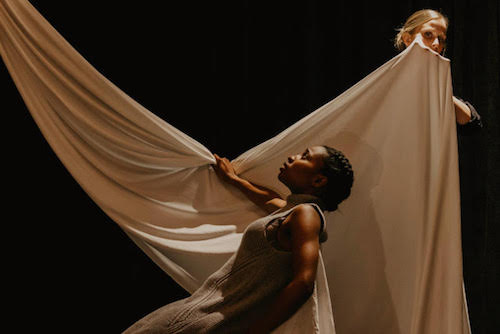 Sarah Ruhl’s In the Next Room (or the Vibrator Play) is now on stage in Toronto
Sarah Ruhl’s In the Next Room (or the Vibrator Play) is now on stage in Toronto
In the Next Room (or the Vibrator Play), being presented by RedWit Theatre at the Tarragon Extraspace, is the Sarah Ruhl play about the Victorian treatment for “hysteria” that earned three Tony nominations in 2010. Set in 1880, as the world begins to electrify, the play takes place in the home of Dr. Givings (Christina Fox), who has introduced his (utterly clinical) invention to reduce depression and languor in the lives of Victorian women. The device, essentially an ur-vibrator, induces a restorative “paroxysm” in the woman to relieve congestion in the womb.
Despite the comedic aspects of this setup – and there are many inherent in the characters’ seeming utter ignorance of sex as an instrument of pleasure – this is also a play about sadness, about desperately limited and constricted lives, and the people who chafe at those boundaries. Central to its message is Mrs. Givings (Hannah Wayne-Phillips), who has recently had a baby but cannot produce milk to feed her. She is fascinated by the brightening world, while fearful of completely moving out of the flickering candle-light. Depressed in her marriage to an older, remote husband, she’s joined by patient Mrs. Daldry (Allison Shea Reed), who has her own frustrations with her husband and fascination with Dr. Givings’ spinster assistant Annie (Krystina Bojanowski).
Also instrumental to Mrs. Givings’ awakening is wet nurse Elizabeth (Asha James), a black woman who has milk to spare due to the loss of her most recent child, and who is always there to obliquely or directly remind Mrs. Givings and Daldry that, while they lead currently unfulfilling lives, they are also unaware of their privilege in other aspects. She’s also the only character with any real knowledge of her own body and a relationship’s potential to be emotional and sexually gratifying, rather than a responsibility.
Ruhl’s script, like much of her writing is lyrical, poetic, exuberant, and silly at turns. It’s entertaining, and its central metaphor linking the proliferation of electricity to the internal illumination of women new to the concept of sexual agency is strong. It’s also surprisingly slow-moving in the first act, despite the copious on-stage paroxysms. Things are much invigorated in Act 2 by the appearance of Sepehr Reybod as Leo, an artist being treated for an unusual case of male hysteria, who brings a jolt of life and passion to the proceedings.
In general, Ruhl’s script asks for a bit more than it gets from the acting, which is perfectly serviceable but often lower-energy than the words demand. Slight issues in timing and pacing sometimes cause a serious speech to land as a joke, or a joke to land with less impact.
Christina Fox’s version of Dr. Givings is played very small, and has a few struggles with enunciation. Though the role of the uptight and clinical man of science does call for a certain reserved aspect and outward anti-charisma, it also, I think, requires a level of quiet (if confused) charisma and passion underneath if the ending is to work.
The casting choice of a woman in the role of the male Dr. Givings (played male) is interesting and specific to this production, not scripted. The play’s message is a feminist one, and in general I love cross-gender casting. In this case, it felt a little distracting to explore the meaningful disconnect in gender expectations between the main opposite-sex couple with same-sex actors, largely because there were already so many different displays of intimacy and attraction between female characters already. I couldn’t tell whether or not the production wanted to assign meaning to the choice.
[Addendum: After posting this review, I was made aware that Christina Fox had by necessity substituted into this role with only two weeks’ notice. With this in mind, she absolutely does an admirable job, though the effect on the production still exists.]
Allison Shea Read as Mrs. Daldry effectively portrays the surprise and anxiety of her character, and Hannah Wayne-Phillips likewise does some good work with Catherine Givings’ increased desperation to be heard and loved. Krystina Bojanowski projects a quiet, salt-of-the-earth intensity as Annie gradually bonds with Mrs. Daldry; in fact, I wished Annie’s part were more developed, as the story established the chemistry between the two early on, then let their interactions languish for much of the play’s middle.
Director Mallory Fisher’s production’s limited budget succeeds in its simple, effective set, especially the side of the stage that resembles an operating room, stark white with tables and overhead mirrors. The other side strikingly features an electric light with large, glowing filament, and is otherwise blank, the better for Mrs. Givings to decorate it with chalked recordings of her increasingly desperate observations.
Ruhl is notable for her wildly imaginative and often impossible stage directions, and much of that is reflected in prop and sound design, with the Givings’ baby being represented as a length of coiled and uncoiled rope (a fine visual for the restrictions and motherhood), cries that sound like breaking dishes, and each woman’s paroxysm given a different soundscape. Budget constraints are clearer in costumes (Judie Plaza), which attempt period but are varying levels of anachronistic.
In the Next Room is a show that’s worth seeing, even if the production could use slightly more animation. In the words of another Victorian play, it “produces vibrations.”
Details:
- In the Next Room (or the Vibrator Play) plays at the Tarragon Extraspace (30 Bridgman Ave.) until Sunday, January 27th.
- Shows run Tuesday-Saturday at 8PM, with Saturday-Sunday matinees at 2:30PM.
- Tickets are $17-32 and can be purchased online, by calling 416-531-1827, or in-person at the Tarragon Box Office.
- This play deals with mature themes of sexuality and features simulated sexual experiences on stage.
Photo of Asha James and Christina Fox provided by the company
